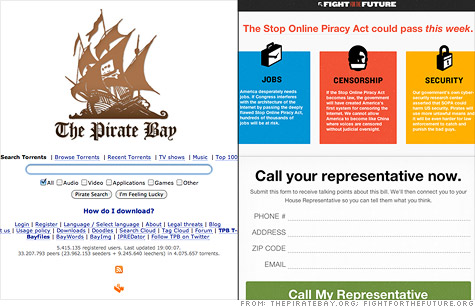SOPA explained: What it is and why it matters – Jan. 17, 2012
The tech industry is abuzz about SOPA and PIPA, a pair of anti-piracy bills. Here’s why they’re controversial, and how they would change the digital landscape if they became law.
What is SOPA? SOPA is an acronym for the Stop Online Piracy Act. It’s a proposed bill that aims to crack down on copyright infringement by restricting access to sites that host pirated content.
SOPA’s main targets are “rogue” overseas sites like torrent hub The Pirate Bay, which are a trove for illegal downloads of movies and other digital content.
Content creators have battled against piracy for years — remember Napster? — but it’s hard for U.S. companies to take action against foreign sites. So SOPA’s goal is to cut off pirate sites’ oxygen by requiring U.S. search engines, advertising networks and other providers to withhold their services.
That means sites like Google wouldn’t show flagged sites in their search results, and payment processors like eBay’s (EBAY, Fortune 500) PayPal couldn’t transmit funds to them.
Both sides say they agree that protecting content is a worthy goal. But opponents say that the way SOPA is written effectively promotes censorship and is rife with the potential for unintended consequences.
Silicon Valley woke up and took notice of the implications when SOPA was introduced in the House of Representatives in October. But its very similar counterpart, PIPA, flew under the radar and was approved by a Senate committee in May. PIPA is now pending before the full Senate and scheduled for a vote on January 24, though some senators are pushing for a delay.
SOPA explained: What it is and why it matters – Jan. 17, 2012.








Recent Comments